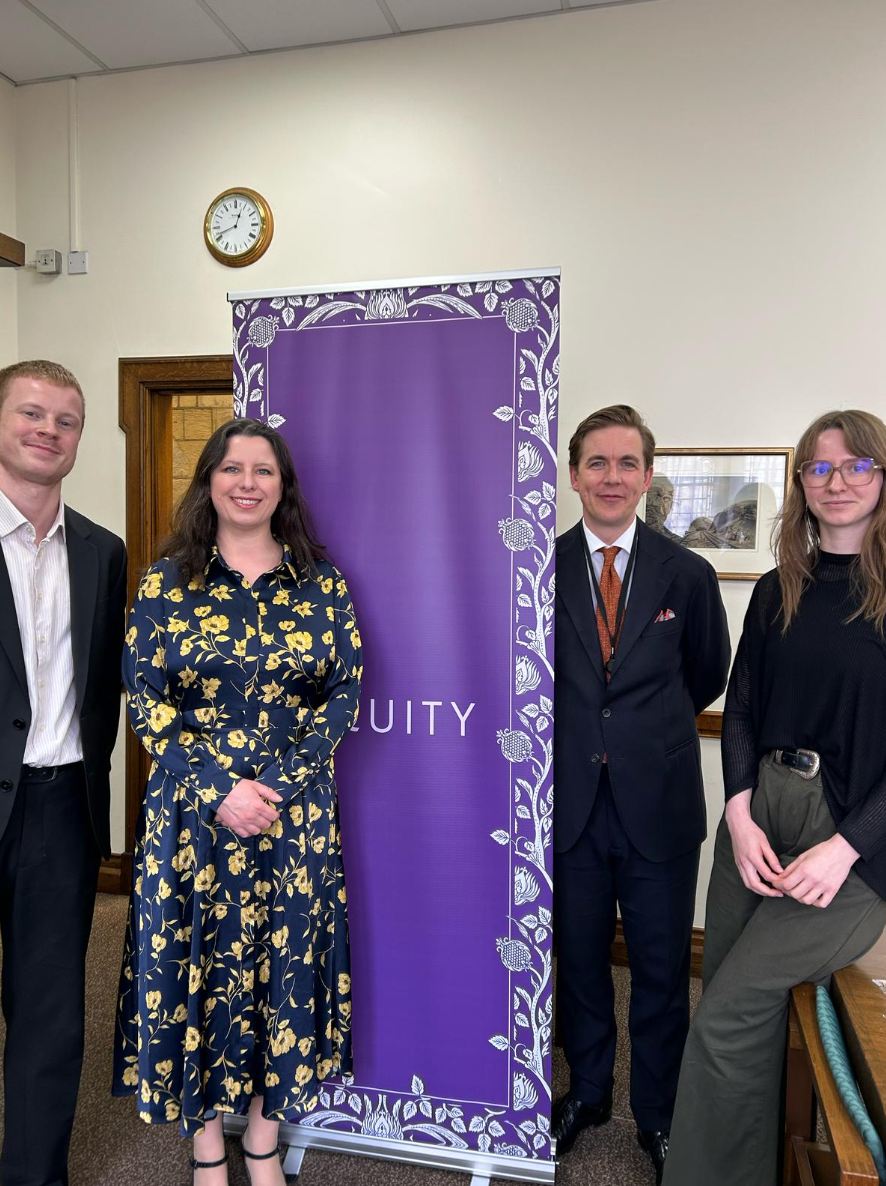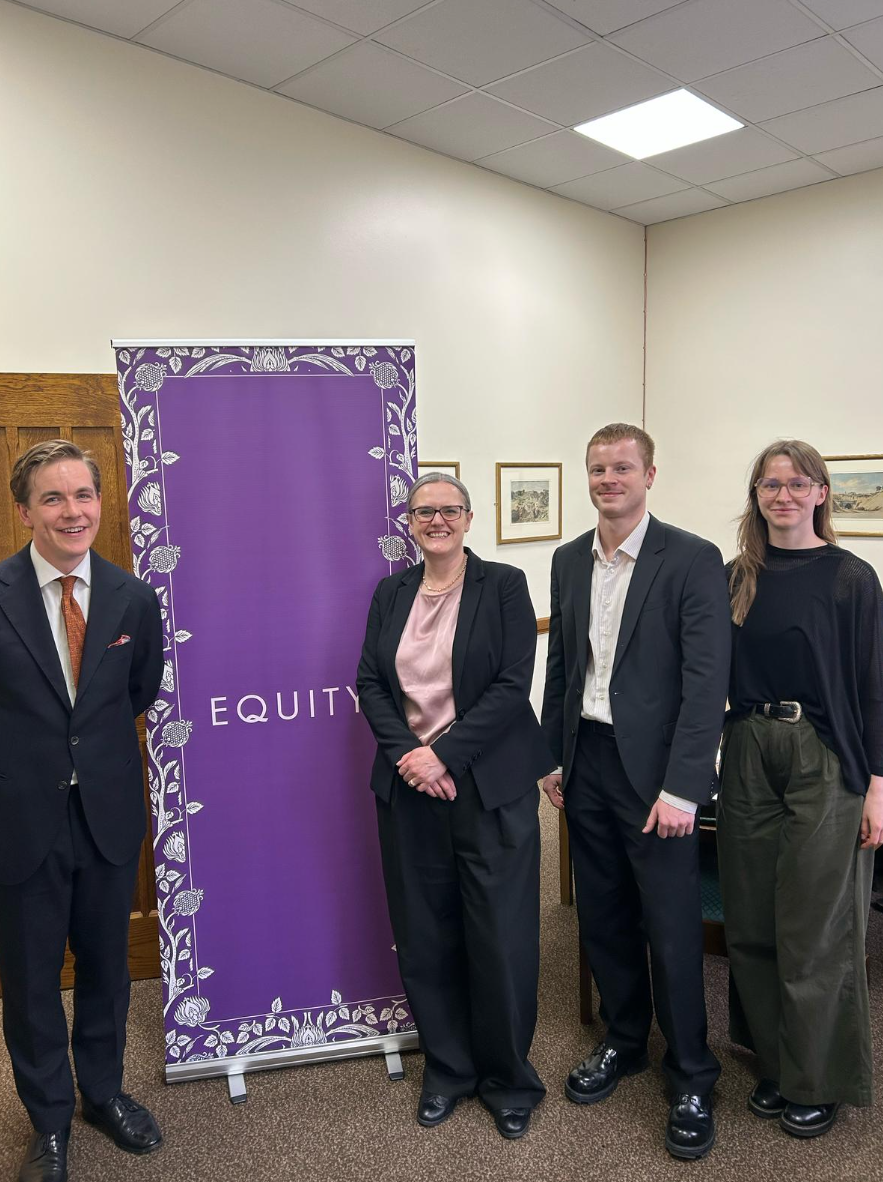Politicians from a wide range of political parties lined up to express support for creative workers’ rights in the face of threats from generative AI (GAI), illegal scraping and unhelpful proposals from government in a parliamentary debate on Wednesday 23 April.
The packed Westminster Hall debate on the Impact of AI on intellectual property was secured by James Frith, the Labour MP for Bury North, and it focused squarely on protecting and strengthening creative workers' rights and championing the creative industries.
Equity has consistently raised concerns about the threat that GAI poses to creative workers - including performers, audio artists, writers, singers, musicians and more. Many Equity members have experienced their performances, likeness or voice being illegally 'scraped' and then used by AI platforms without their knowledge or consent and without remuneration. Equity argues that copyright, IP and GDPR rights should be enforced to protect creatives' work, that licensing is an established approach, and that the government's preferred opt-out model would be unworkable in practice. These arguments were made by dozens of MPs hoping the Minister was receptive.
Opening the debate, James Frith explained that "whole sections of our creative industries being ripped off", going on to say that creative industries "are not seeking to change the rules of the game, only to ensure their rights are upheld."
Themes of transparency, enforcement, consent and applying existing copyright and related laws cropped up time and again. The consensus about the value of the UK's creative industries was clear.
“Industrial-scale, unregulated scraping is not innovation, it is infringement. It erodes the certainty that investors need” said James Frith. He went on to name-check Equity and directly asked the minister whether he would “consider introducing a stronger framework for personality rights under the Data Bill, as being proposed by Equity and the wider creative sector, to improve protections against the illegal exploitation of artistic works by GAI companies?”
Contributing to the debate, Caroline Dinenage MP, Chair of the Culture, Media and Sport Select Committee, described the creative industries as “our global superpower – both economically and reputationally”. She explained that “this doesn’t happen by accident; they rely on the strength of a gold-standard British copyright regime” – another strong endorsement for protecting creatives’ from AI exploitation.
Television script writer Alison Hume MP spoke with experience from her career, explaining the role of Collecting Societies to “ensure creatives receive fair payment for their work.” In relation to upholding existing rights, she argued that “licensing does work; it’s worked for over 100 years… [it] protects authors and rights holders from exploitation.” Her message to the minister was “we must protect our creative working people.”
Copyright was described by James Frith as “a cornerstone of the UK economy”. “Copyright is not an obstacle,” he said, “it’s an infrastructure. We should not be weakening it. … Creatives should not have to sue to keep their rights.” Supporting this position, Samantha Niblett MP, who has a background in data and tech industry, said: “Copyright is not an inconvenience, it is not a technically, it is the legal and moral framework that ensures that creatives are rewarded for their creations.”
Vicky Slade, MP for Dorset and North Poole, critiqued the government’s proposals, asking the crucial question: “Is the government really suggesting that performers and creatives should work for free?” She continued: “Today I met with Equity, who explained the risks in very simple terms. Just like PRS ensures that musicians are paid when their track is plaid on the radio, the same principle applies to a voice or performance on screen. But without the solid copyright positions remaining in place, AI will use that voice without their knowledge, consent and payment by people around the world. The people who created the work deserve to keep what is theirs.”
Several MPs brought the importance of the workforce and creatives’ experience to the debate. John McDonnell, an MP who works closely with creative unions, emphasised the importance of collective and sectoral bargaining to ensure minimum standards. “Copyright law should be respected – it’s not difficult, you simply secure a license. We need to protect the gold mine of creativity in this country”, he said. Adding his voice to this element of the debate, Corby and East Northants MP Lee Barron urged the government to “fix this.” He said: “Let us give working people the rights they need in the AI age. We have copyright law for a reason, so let us update and strengthen it. Tech companies cannot just take—there must be rules and no opt-outs.”
Throughout the debate, MPs rejected the government’s proposals on AI, with James Frith saying, “There is little faith in an opt-out model.” Samantha Niblett said, “there are no opt out options that work” and Natasha Irons MP added that “opt out system is unworkable and unfair … the government acknowledges the technology to implement an opt-out system does not exist.” The point was furthered by Pete Wishart MP, who said of the government’s preferred opt out scheme: “Like a finely tuned chorus, the creative sector came back as one and said it does not like it one bit”, before adding “our creative heritage is not there to be plundered.”
Morecambe MP Lizzie Collinge urged the government to not “rollover for megacorporations who don’t care about our values”. She complained that despite the UK having a “clear copyright laws and licensing scheme... these have been run over roughshod.” Anneliese Midgley MP echoed this, saying “no one should be allowed to use someone’s work without permission or payment – that’s called theft.”
Speaking about the experience of creatives, James Frith said: “The stories are increasingly familiar: entire creations and careers copied, remixed into data, while the original human creator and rights owner is left out of the conversation entirely.”
Creative industries Minister Chris Bryant responded to the debate for the government, saying “I completely agree that creators need to be remunerated.” He referred to his own work as an author being scraped, describing such practices as “patently wrong”. He distanced the government from plans to legislate in favour of an opt-out system, in relation to the Data Bill at least, saying “there is no clause in it, on opt-out.”
The Minister left the attendees with a commitment that he was “determined to get us to a place where people are properly remunerated, where they are able to enforce their rights, and where AI can flourish in this country and be used by the creative industries and the creative industries are not left by the wayside.”

Ahead of the debate, Equity hosted a drop-in session for MPs to explain the threats to Equity members’ livelihoods through illegal scraping and ignoring copyright, IP and GDPR laws.

Watch the debate in full: Parliamentlive.tv - Westminster Hall or read on Hansard: Intellectual Property: Artificial Intelligence - Hansard - UK Parliament.




